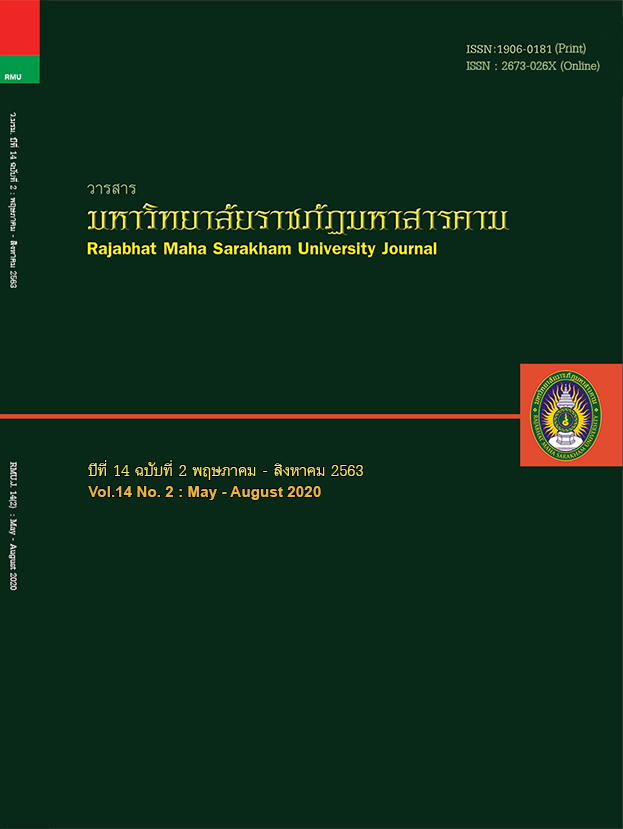Agrochemicals Use Reduction Compensation of Chiang Dao Farmers in Chiang Mai Province
Main Article Content
บทคัดย่อ
Chiang Dao district in Chiang Mai province is located nearby two food safety districts however Chiang Dao is not a member of Chiang Mai food safety network. Therefore, this paper applies a choice experiments to estimate the willingness to accept of farmers for reducing the use of agrochemical inputs in their fields. The four attributes are identified including use of chemical fertilizer, chemical herbicide, chemical insecticide, and compensation. The empirical results found that less than 1500 baht / rai / year of compensation may encourage farmers to reduce agrochemicals use in their farms. These amounts of compensation are not only encouraging farmers to reduce agrochemicals use but also causing the positive effects to farmers and consumers health as well as environments
Article Details
1. บทความที่ลงตีพิมพ์ทุกเรื่องได้รับการตรวจทางวิชาการโดยผู้ประเมินอิสระ ผู้ทรงคุณวุฒิ (Peer Review) สาขาที่เกี่ยวข้อง อย่างน้อย 3 ท่าน ในรูปแบบ Double blind review
2. ข้อคิดเห็นใด ๆ ของบทความที่ลงตีพิมพ์ในวารสารมหาวิทยาลัยราชภัฏมหาสารคาม นี้เป็นของผู้เขียน คณะผู้จัดทำวารสารไม่จำเป็นต้องเห็นด้วย
3. กองบรรณาธิการวารสารมหาวิทยาลัยราชภัฏมหาสารคาม ไม่สงวนสิทธิ์การคัดลอกแต่ให้อ้างอิงแสดงที่มา
เอกสารอ้างอิง
Bateman I. J.et al. (2003). Guidelines for the Use of Stated Preference Techniques for the Valuation of Preferences for Non-market Goods, Cheltenham: Edward Elgar.
Birol E., M.Smale and A. Gyovai. (2006). Using a Choice Experiment to Estimate Farmers’ Valuation of Agrobiodiversity on Hungarian Small Farms. Environmental and Resource Economic. 34, 439 - 469.
Bureau of Occupational and Environmental Diseases. (2012). Illness and Effects of Pesticides. Retrieved January 29, 2018,
fromhttp://envocc.ddc.moph.go.th/uploads/situation/4_4_situation.pdf
Green Net. (2019). Policies on Organic Agriculture in Thailand. Retrieved February 28, 2019.
from http://www.greennet.or.th/en/article/1862
Green Net. (2019). Thai Organic 2017/18: Leap Jump but will It be Sustainable. Retrieved February 28, 2019. fromhttp://www.greennet.or.th/en/article/1980
Hfocus. (2019). Effects of Pesticides. Retrieved March 29, 2020,
from https://www.hfocus.org/content/2019/08/17468
Hnin Ei Win. (2017). Organic Agriculture in Thailand. Retrieved February 9, 2020.
from http://ap.fftc.agnet.org/ap_db.php?id=734
Jianjun J., W. Wenyu, H. Rui and G. Haozhou. (2017). Valuing Health Risk in Agriculture: A Choice Experiment Approach to Pesticide Use in China. Environmental Science and Pollution Resource. 24, 17526 - 17533.
Khan M. and C.A. Damalas. (2015). Farmers’ Willingness to Pay for Less Health Risks by Pesticide Use: A Case Study From the Cotton Belt of Punjab, Pakistan. Science of theTotal Environment. 15, 297 - 303.
Lancaster K. (1966). A New Approach to Consumer Theory. Journal of Political Economy. 84, 132 - 157.
Nunthasen K. andW. Nunthasen. (2019). Organic Farming Policy Effects in Northern of Thailand: Spatial Lag Analysis. Advances in Intelligent Systems and Computing. 769, 297 - 305.
Office of Agricultural Economics. (2019). Quantity and Value of Import Hazard Agricultural Products in 2011-2017. Retrieved March 1, 2019. fromhttp://oldweb.oae.go.th/economicdata/pesticides.html
Pompratansombat P., B.Bauer and H. Boland. (2011).
The Adoption of Organic Rice Farming in Northeastern Thailand. Journal of Organic System. 6(3), 4 - 12.
Stolze M. and N.Lampkin (2009). Policy for Organic Farming: Rationale and Concepts. Journal of Food Policy. 34, 237 – 244.
Sukallaya K. and B. T. Gopal. (2011). Crop Diversification in Thailand: Status, Determinants, and Effects on Income and Use of Inputs. Journal of Land Use Policy. 28, 618 - 628.
The Government Public Relationship Department. (2014). New Strategies for Developing Thailand’s Organic Agriculture. Retrieved on February 9, 2020. from https://thailand.prd.go.th/ewt_news.php?nid=1356&filename=index
Yu, L.L. and Y.Y. Cai. (2015). Ecological Compensation Based on Farmers' Willingness: A Case Study of Jingsan County in Hubei Province, China. Ying Yong Sheng Tai Xue Bao. 26(1), 215 - 223.
Veisi A., M.Gholami and N.Shiri. (2013).What are the Barriers to the Development of Organic Farming?. Scientific Papers Series Management, Economic Engineering in Agriculture and Rural Development. 13(3), 321 - 326.


